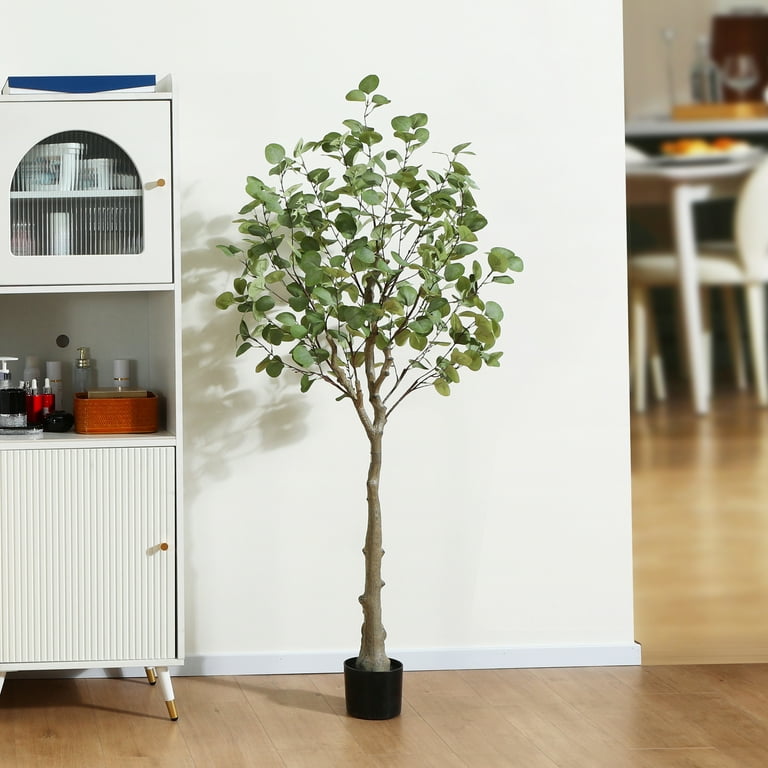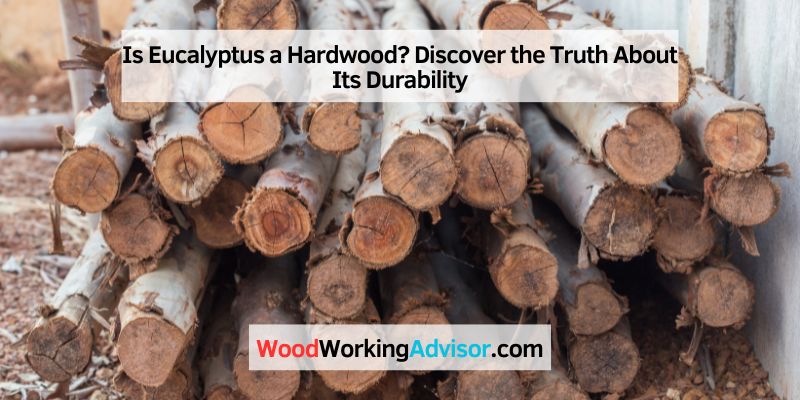Eucalyptus is a type of hardwood. It is known for its durability and strength.
Eucalyptus is a popular hardwood known for its durability and strength. Its robust characteristics make it suitable for a variety of applications, from construction and flooring to furniture and cabinetry. With its attractive grain patterns and natural resistance to pests and decay, eucalyptus is a sought-after material in the woodworking industry.
This hardwood is native to Australia, where it is abundant and widely used. Its hardness and density contribute to its excellent performance in demanding environments. Additionally, eucalyptus is favored for its sustainable qualities, as it is fast-growing and renewable. Whether you are interested in implementing eucalyptus in your next project or simply curious about hardwoods, this guide will explore the various aspects and benefits of eucalyptus as a hardwood.

Credit: www.amazon.com
Eucalyptus Wood Characteristics
Eucalyptus wood is often considered a hardwood due to its density and durability, making it suitable for outdoor furniture and decking. With natural resistance to decay and insects, it’s an eco-friendly choice for various applications, blending strength with sustainability.
Eucalyptus wood is a popular choice for a variety of applications due to its unique characteristics. Its natural hardness, distinct grain patterns, and other notable attributes make it a sought-after material in the woodworking and furniture industries. Let’s take a closer look at each of these aspects.
Natural Hardness
Eucalyptus is classified as a hardwood, known for its superior strength and durability. This wood type is denser and harder than softwoods like pine and spruce, making it highly resistant to wear and tear. Eucalyptus wood’s hardness allows it to withstand heavy use and external forces, ensuring longevity in applications that require substantial weight-bearing capacity.
Grain Patterns
Eucalyptus wood exhibits beautiful grain patterns that add visual appeal to any piece of furniture or woodworking project. The grain patterns found in eucalyptus wood can vary from straight to interlocking, providing a unique and distinct appearance. The natural variations and striations create a visually interesting texture, making eucalyptus an ideal choice for individuals seeking a more organic and rustic aesthetic.
The distinct grain patterns of eucalyptus wood are further enhanced when the wood is properly finished and sealed. The natural beauty of the grain can be showcased through various techniques such as staining or oiling, allowing the unique character of the wood to shine through.
Comparing Eucalyptus With Traditional Hardwoods
Eucalyptus is often compared to traditional hardwoods due to its strength, durability, and resistance to decay. Let’s delve deeper into these aspects and see how eucalyptus measures up against its counterparts.
Strength And Durability
Eucalyptus wood is renowned for its impressive strength and durability, making it a popular choice for various applications. With a Janka hardness rating of around 1,100 lbf (pound-force), eucalyptus falls within the range of many traditional hardwoods like oak and maple.
One of the reasons why eucalyptus stands out is its natural water-resistant properties, contributing to its resilience and ability to withstand heavy use, making it a viable option for outdoor furniture and decking.
Moreover, eucalyptus possesses a tight grain structure, which enhances its strength and helps prevent warping and splitting over time. This attribute further solidifies its comparability to traditional hardwoods.
Resistance To Decay
Eucalyptus possesses natural oils that act as a deterrent against insects, rot, and decay. These oils provide an innate resistance to the damaging effects of moisture, making eucalyptus an excellent choice for outdoor applications.
While traditional hardwoods such as oak and maple are also known for their durability, eucalyptus excels in its resistance to decay. This feature makes it particularly suitable for furniture and structures exposed to the elements.
It’s worth noting that regular maintenance, such as applying protective finishes, can enhance the longevity and appearance of eucalyptus wood, ensuring it withstands the test of time.
In Conclusion
In conclusion, when comparing eucalyptus to traditional hardwoods, it’s clear that eucalyptus holds its own in terms of strength, durability, and resistance to decay. Considered a cost-effective and sustainable alternative, eucalyptus offers a wide range of applications for both indoor and outdoor settings without compromising on quality.
Common Uses Of Eucalyptus Wood
Eucalyptus wood, commonly known for its strength and durability, is widely used in various applications. With its natural resistance to decay and rot, eucalyptus wood is a popular choice for both indoor and outdoor furniture. Let’s explore the common uses of eucalyptus wood in greater detail.
Indoor Furniture
Eucalyptus wood is extensively used to craft indoor furniture due to its robust nature and appealing aesthetics. From dining tables and chairs to bookshelves and cabinets, eucalyptus wood adds a touch of sophistication to interior spaces. Its rich, reddish-brown hue and smooth finish make it a preferred material for creating elegant indoor furniture pieces.
Outdoor Applications
Eucalyptus wood is an ideal choice for outdoor applications owing to its remarkable weather resistance. It is commonly utilized for crafting outdoor furniture, such as patio sets, loungers, and benches. Additionally, eucalyptus wood is employed in the construction of decks, fences, and pergolas, as it can withstand the harsh outdoor elements, including moisture and sunlight, without succumbing to deterioration.
Sustainability Of Eucalyptus Harvesting
When it comes to sustainable wood options, eucalyptus is a popular choice due to its fast growth and eco-friendly practices. By understanding the sustainability of eucalyptus harvesting, we can evaluate its environmental impact and make more informed choices when it comes to selecting hardwood for various purposes.
Fast Growth
One of the remarkable characteristics of eucalyptus is its ability to grow rapidly. With a growth rate that surpasses most traditional hardwood species, eucalyptus can be harvested in a shorter period without compromising the overall supply of timber. This fast growth makes eucalyptus a viable option for meeting high demand, ensuring a sustainable source of hardwood for a variety of applications.
Eco-friendly Practices
Eucalyptus harvesting involves eco-friendly practices that promote sustainability. Unlike some other hardwoods, eucalyptus trees can be harvested without clear-cutting entire forests. Instead, selective cutting methods are employed, allowing for the preservation of surrounding trees and the natural ecosystem. By using this method, eucalyptus plantations can maintain their biodiversity and provide habitats for various animal species.
Furthermore, eucalyptus plantations often utilize sustainable forestry practices, including reforestation initiatives and responsible land management. These practices ensure that the harvested trees are replaced promptly, maintaining the long-term sustainability of eucalyptus resources. This thoughtful approach helps protect against deforestation, soil erosion, and other harmful environmental effects.
Additionally, eucalyptus trees have natural defense mechanisms against pests and diseases, reducing the need for excessive use of pesticides or chemicals during cultivation. This characteristic contributes to its eco-friendly reputation and ensures that eucalyptus timber maintains its natural integrity and purity.
In conclusion, the sustainability of eucalyptus harvesting is evident through its fast growth and eco-friendly practices. By choosing eucalyptus hardwood for various purposes, individuals and industries can contribute to environmental conservation and promote responsible forestry practices.
Maintenance And Care For Eucalyptus Wood Products
Eucalyptus wood is not only beautiful but also highly durable, making it a popular choice for furniture, flooring, and outdoor lumber. However, like any wood product, it requires regular maintenance to ensure its longevity and keep it looking its best. In this section, we will explore some important preventive measures, cleaning techniques, and preservation methods that will help you take care of your eucalyptus wood products.
Preventive Measures
Prevention is the key to keeping your eucalyptus wood in top condition. Here are some preventive measures you can take:
- Keep your eucalyptus wood products away from direct sunlight and extreme temperatures to avoid warping and fading.
- Use coasters, placemats, and trivets to protect your eucalyptus furniture from stains and heat damage.
- Apply felt pads to the bottom of furniture legs to prevent scratches on your floors.
- Regularly inspect your eucalyptus wood for signs of mold, mildew, or insect infestation. If any are detected, take appropriate action immediately.
Cleaning And Preservation
To keep your eucalyptus wood products clean and well-preserved, follow these cleaning and preservation tips:
- Dust your eucalyptus wood furniture regularly using a soft cloth or a feather duster to remove any loose dirt or debris.
- For tougher stains, mix a mild soap or dishwashing liquid with warm water. Dip a soft cloth into the soapy solution, wring it out, and gently scrub away the stain. Rinse with clean water and dry thoroughly.
- For outdoor eucalyptus furniture, regularly remove any dirt or grime using a brush and soapy water. Rinse well and allow it to air dry.
- To enhance the natural beauty of the wood and protect it from moisture, consider applying a high-quality wood sealant or oil specifically designed for eucalyptus wood.
- Reapply the wood sealant or oil annually or as recommended by the manufacturer.
By following these preventive measures, cleaning techniques, and preservation methods, you can ensure that your eucalyptus wood products remain in excellent condition for years to come.

Credit: www.walmart.com
Frequently Asked Questions Of Is Eucalyptus A Hardwood
What Are The Disadvantages Of Eucalyptus Wood?
Eucalyptus wood has a few disadvantages. It is prone to splitting and warping if not properly dried. It can also be challenging to work with due to its hardness. Additionally, it may not be suitable for certain climates and can be vulnerable to pests and decay if not treated adequately.
Is Eucalyptus A Hard Or Soft Wood?
Eucalyptus is a hardwood, known for its strength and durability. With its natural resistance to rot and insect damage, it is often used for outdoor furniture and decking.
Can I Burn Eucalyptus Wood?
Yes, you can burn eucalyptus wood. It produces high heat and minimal creosote. Ensure proper seasoning to avoid excessive smoke and potential fire hazards.
Is Eucalyptus Wood Very Hard?
Eucalyptus wood is known for its hardness, making it a durable choice for various applications.
Conclusion
As we’ve explored, Eucalyptus is indeed a hardwood, known for its durability and strength. Its various applications and the sustainable nature of its cultivation make it an attractive choice for many projects. Whether in construction or furniture, Eucalyptus proves to be a versatile and resilient material worth considering.


